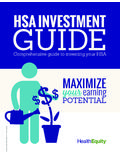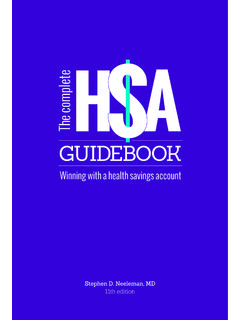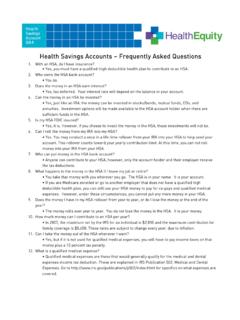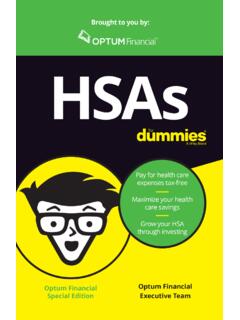Transcription of Health Savings Accounts - CPN, Inc.
1 Health Savings Accounts Start saving more on healthcare. A Health Savings account (HSA) is an individually-owned, tax advantaged account that you can use to pay for current or future IRS qualified medical expenses. With an HSA, you'll have the potential to build more Savings for healthcare expenses or additional retirement Savings through self-directed investment options . How an HSA works: You can contribute to your HSA via payroll deduction, online banking transfer, or by sending a personal check to HSA Bank. Your employer or third parties, such as a spouse or parent, may contribute to your account as well. You can pay for qualified medical expenses with your Health Benefits Debit Card directly to your medical provider or pay out-of-pocket. You can either choose to reimburse yourself or keep the funds in your HSA to grow your Savings . Unused funds will roll over year to year.
2 After age 65, funds can be withdrawn for any purpose without penalty (subject to ordinary income taxes). Check balances and account information via HSA Bank's Member Website or mobile device 24/7. Are you eligible for an HSA? If you have a qualified High Deductible Health Plan (HDHP) - either through your employer, through your spouse, or one you've purchased on your own - chances are you can open an HSA. Additionally: You cannot be covered by any other non-HSA-compatible Health plan, including Medicare Parts A and B. You cannot be covered by TriCare. You cannot be claimed as a dependent on another person's tax return (unless it's your spouse). You must be covered by the qualified HDHP on the first day of the month. When you open an account , HSA Bank will request certain information to verify your identity and to process your application. What are the annual IRS contribution limits?
3 Contributions made by all parties to an HSA cannot exceed the annual HSA limit set by the Internal Revenue Service (IRS). Anyone can contribute to your HSA, but only the accountholder and employer can receive tax deductions on those contributions. Combined annual contributions for the accountholder, employer, and third parties ( , parent, spouse, or anyone else) must not exceed these 2017 Annual HSA 2018 Annual HSA According to IRS guidelines, each year you have until the tax filing deadline to contribute to your HSA. Contribution Limits Contribution Limits (typically April 15 of the following year). Online contributions must be submitted by 2:00 , Central Time, the business day before the tax filing deadline. Wire contributions must be received by noon, Individual = $3,400 Individual = $3,450 Central Time, on the tax filing deadline, and contribution forms with checks must be received by the Family = $6,750 Family = $6,900 tax filing deadline.
4 Catch-up Contributions Accountholders who meet these qualifications are eligible to make an HSA catch-up contribution of $1,000: Health Savings accountholder; age 55 or older (regardless of when in the year an accountholder turns 55); not enrolled in Medicare (if an accountholder enrolls in Medicare mid-year, catch-up contributions should be prorated). Authorized signers who are 55 or older must have their own HSA in order to make the catch-up contribution. How can you benefit from tax Savings ? An HSA provides triple tax Here's how: Contributions to your HSA can be made with pre-tax dollars and any after-tax contributions that you make to your HSA are tax deductible. HSA funds earn interest and investment earnings are tax free. When used for IRS-qualified medical expenses, distributions are free from tax. IRS-Qualified Medical Expenses You can use your HSA to pay for a wide range of IRS-qualified medical expenses for yourself, your spouse, or tax dependents.
5 An IRS- qualified medical expense is defined as an expense that pays for healthcare services, equipment, or medications. Funds used to pay for IRS-qualified medical expenses are always tax-free. HSA funds can be used to reimburse yourself for past medical expenses if the expense was incurred after your HSA was established. While you do not need to submit any receipts to HSA Bank, you must save your bills and receipts for tax purposes. Examples of IRS-Qualified Medical Expenses4: Acupuncture Gynecologist Psychologist Alcoholism treatment Hearing aids and batteries Smoking cessation programs Ambulance services Hospital bills Special education tutoring Annual physical examination Insurance premiums5 Surgery Artificial limb or prosthesis Laboratory fees Telephone or TV equipment to Birth control pills (by prescription) Lactation expenses assist the hearing or vision Chiropractor Lodging impaired Childbirth/delivery (away from home for Therapy or counseling Convalescent home outpatient care) Medical transportation expenses (for medical treatment only) Nursing home Transplants Crutches Nursing services Vaccines Doctor's fees Obstetrician Vasectomy Dental treatments Osteopath Vision care (including x-rays, braces, Oxygen (including eyeglasses, dentures, fillings, oral surgery) Pregnancy test kit contact lenses, lasik surgery).
6 Dermatologist Podiatrist Weight loss programs Diagnostic services Prescription drugs and medicines ( for a specific disease Disabled dependent care (over-the-counter drugs are not diagnosed by a physician such Drug addiction therapy IRS-qualified medical expenses as obesity, hypertension, or heart Fertility enhancement unless prescribed by a doctor) disease). (including in-vitro fertilization) Prenatal care & postnatal Wheelchairs Guide dog treatments X-rays (or other service animal) Psychiatrist Investment Accounts are not FDIC insured, may lose value and are not a deposit or other obligation of, or guarantee by the bank. Investment losses which are replaced are subject to the annual contribution limits of the HSA. 2 HSA funds contributed in excess of these limits are subject to penalty and tax unless the excess and earnings are withdrawn prior to the due date, including any extensions for filing Federal Tax returns.
7 Accountholders should consult with a qualified tax advisor in connection with excess contribution removal. The Internal Revenue Service requires HSA Bank to report withdrawals that are considered refunds of excess contributions. In order for the withdrawal to be accurately reported, accountholders may not withdraw the excess directly. Instead, an excess contribution refund must be requested from HSA Bank and an Excess Contribution Removal Form completed. 3 Federal Tax Savings are available no matter where you live and HSAs are taxable in AL, CA, and NJ. HSA Bank does not provide tax advice. Consult your tax professional for tax related questions. 4 This list is not comprehensive. It is provided to you with the understanding that HSA Bank is not engaged in rendering tax advice. The information provided is not intended to be used to avoid Federal tax penalties. For more detailed information, please refer to IRS Publication 502 titled, Medical and Dental Expenses.
8 Publications can be ordered directly from the IRS by calling 1-800-TAXFORM. If tax advice is required, you should seek the services of a professional. 5 Insurance premiums only qualify as an IRS-qualified medical expense: while continuing coverage under Cobra; for qualified long-term care coverage; coverage while receiving unemployment compensation; for any healthcare coverage for those over age 65 including Medicare (except Medicare supplemental coverage). For assistance, please contact the Client Assistance Center 800-357-6246. | 605 N. 8th Street, Ste. 320, Sheboygan, WI 53081. 2017 HSA Bank. HSA Bank is a division of Webster Bank, , Member FDIC. | HSA_EE_EV1_061917.




